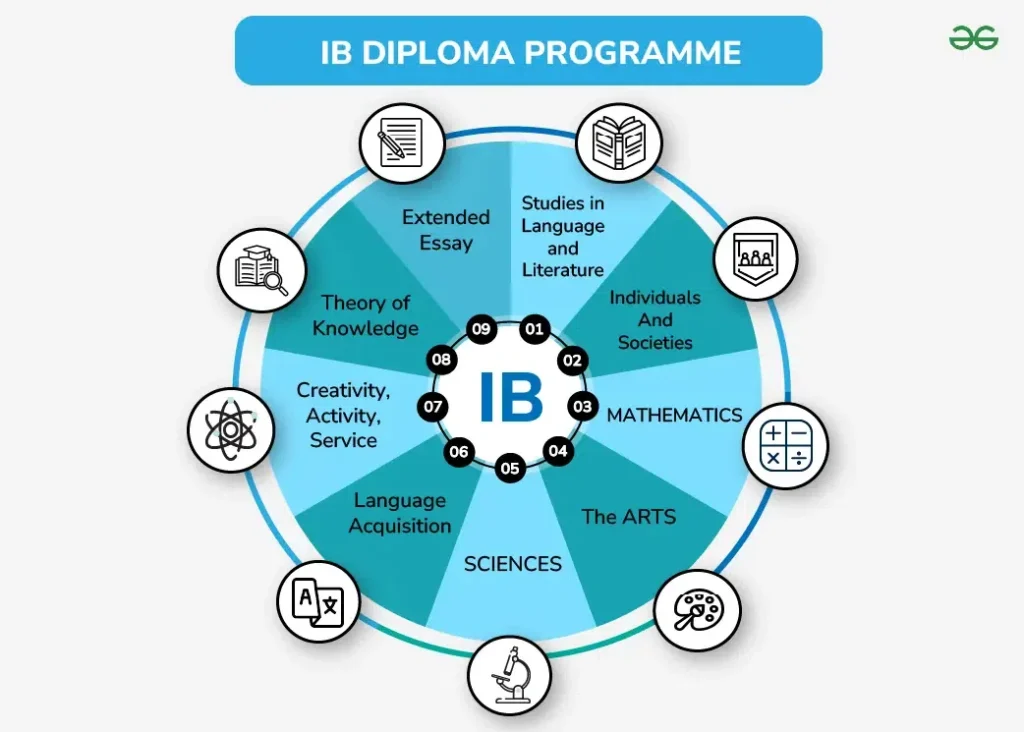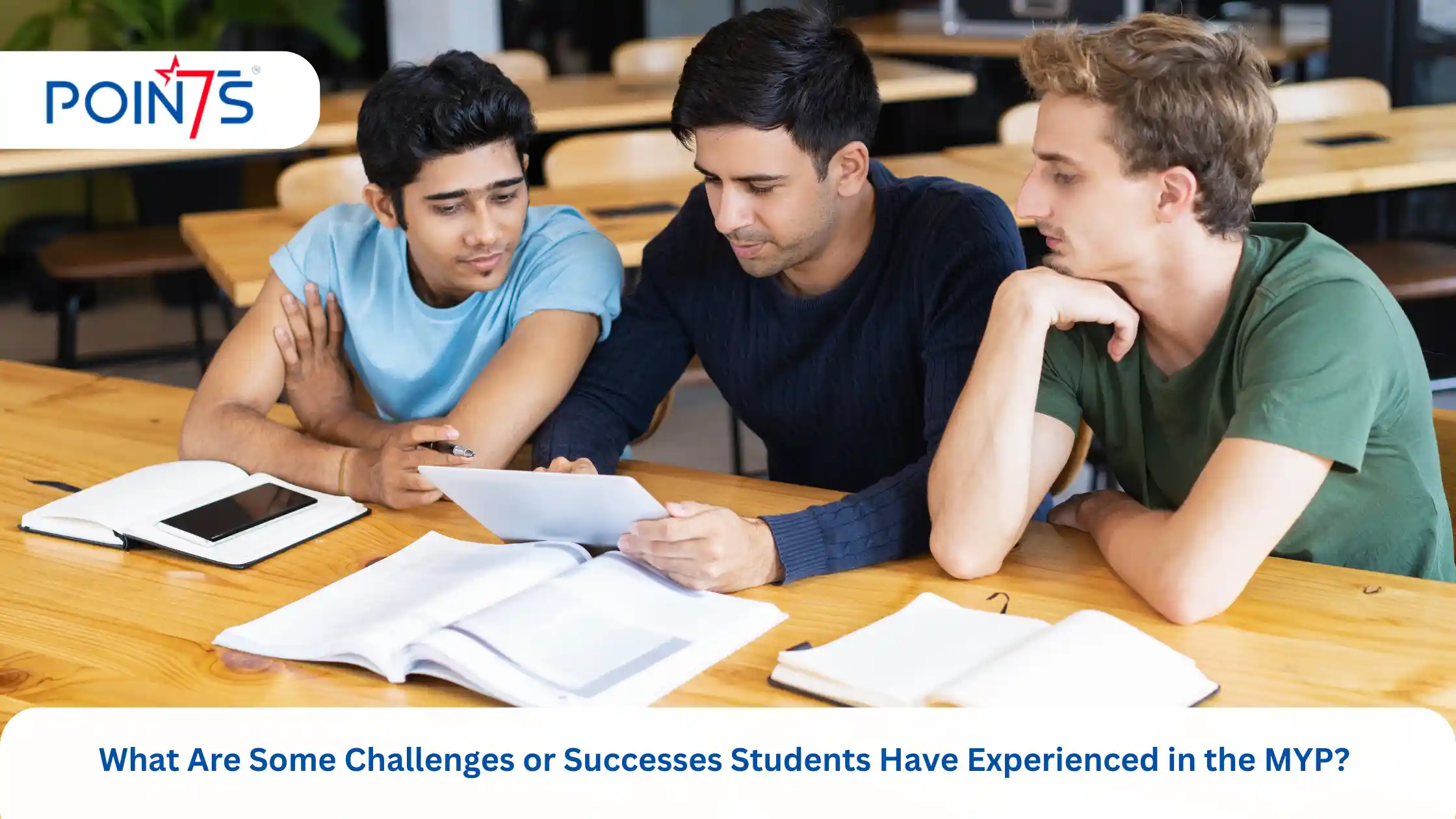Choosing subjects for the IB Diploma Programme is never just about personal interest. The decision often depends on future career goals, academic strengths, and how much academic pressure one can realistically handle. While some subjects are known for being more accessible, others have a reputation for being exceptionally demanding.
If you’re a student or parent trying to make sense of it all, this blog can serve as a detailed guide to the hardest IB subjects, and how Points Edulab can help you prepare smarter, not harder. Now, let’s break down the IB subjects that challenge students the most and how to approach them strategically.

A Quick Overview of the IB Diploma Structure
The IB Diploma Programme (IBDP) encourages students to think critically, research independently, and develop global perspectives. The curriculum is broad, covering six subject groups and three core components:
Six subjects must be chosen across languages, humanities, sciences, mathematics, and the arts.
Three core requirements include Theory of Knowledge (TOK), the Extended Essay (EE), and Creativity, Activity, Service (CAS).
Most students take three subjects at Higher Level (HL) and three at Standard Level (SL). HL subjects typically demand more time, greater depth of study, and tougher assessments, which is why many of them feature in this list.
Criteria for Difficulty Ranking
The difficulty of a subject depends on multiple factors, not just personal interest. We evaluated each subject based on:
– Conceptual depth and abstract thinking
– Volume of content to learn and apply
– Writing or calculation demands
– Grade statistics from global IB results
– Student feedback from India and international IB schools
1. Mathematics: Analysis and Approaches (AA) HL
This subject is considered the toughest IB course by many students and educators. Designed for those interested in careers involving engineering, mathematics, and physical sciences, it focuses on calculus, algebra, functions, and proofs. It doesn’t just test accuracy but your ability to work through unfamiliar problems.
Why it’s challenging:
It’s extremely abstract, fast-paced, and requires a strong foundation in mathematical logic. The need for logical reasoning and creative problem-solving places it among the most difficult IB subjects.
At Points Edulab, We help students tackle problem-solving techniques, manage time effectively in exams, and build conceptual clarity from the ground up.
2. Chemistry HL
Chemistry HL is intense. It blends memorisation with mathematical precision and requires a strong grasp of both theory and practicals. Students are expected to understand structures, equations, organic chemistry, and complex mechanisms, and apply them in lab settings.
Why it’s challenging:
The subject demands attention to detail, excellent recall, and the ability to apply knowledge across unfamiliar contexts.
At Points Edulab, our tutors break down high-volume chapters into manageable modules and guide students through lab preparation, mock IA (Internal Assessment) work, and structured revision. With our guidance, even the hardest IB subjects become more approachable and manageable for every student.
3. History HL
Unlike science subjects, History HL is text-heavy and writing-intensive. Students must study multiple regions, memorise timelines, and write analytical essays under time pressure. In addition to exams, students must evaluate historical sources critically and interpret perspectives.
Why it’s challenging:
Requires both memory and interpretation. Success depends on crafting structured, well-supported essays within tight word and time limits.
We, at Points Edulab, help students refine their writing style, strengthen argument-based thinking, and organise information using timelines, mind maps, and debates.
4. English Literature HL
English Literature HL is all about interpretation. Students read novels, plays, poetry, and essays from different cultures and time periods. The challenge lies in writing sophisticated, structured responses that reflect deep understanding, not just surface-level summaries.
Why it’s challenging:
You must learn to see multiple meanings in a single line of text, write quickly and thoughtfully, and reference texts accurately without being repetitive.
We train students in literary analysis, develop close reading skills, and build confidence through guided essay writing and group discussion.
5. Computer Science HL
This subject combines theoretical understanding with applied skills. It includes algorithms, software development, computer logic, and databases. A lot of students underestimate how demanding it can be until they start falling behind in programming logic or internal assessments.
Why it’s challenging:
Unlike maths, there isn’t always one right answer, especially in code. You need to learn logic, debugging, and project development simultaneously.
At Points Edulab, we work with students on practical projects, teach real-time coding, and focus on simplifying difficult theories in computing systems.
6. Mathematics: Applications and Interpretation (AI) HL
Often chosen by students less inclined towards pure math, AI HL still comes with its share of challenges. It requires a clear understanding of statistics, financial maths, and mathematical modelling using tools like Excel or graphical calculators.
Why it’s challenging:
Although it’s more real-world focused, it still expects accuracy, reasoning, and the ability to interpret real data under exam conditions.
Our instructors guide students through data handling, technological tools, and help them develop clear interpretations in internal assessments.
7. Biology HL
Biology HL demands significant memorisation, understanding of processes, and diagram-based recall. Topics range from cells and genetics to ecosystems and neurobiology. In addition to mastering theory, students must also conduct and write detailed lab investigations.
Why it’s challenging:
Students often struggle with the volume of content and the precision required in practical tasks and exam responses.
At Points Edulab, we offer visual-based learning, concept mapping, and regular quizzes to help students retain information and connect topics logically. With our support, mastering the IB subjects by difficulty becomes much more manageable.
8. Language B HL (Second Language)
While it’s not a ‘technical’ subject, HL language courses can be surprisingly difficult for students who lack confidence in speaking or writing fluently. The syllabus includes grammar, vocabulary, cultural awareness, and oral communication.
Why it’s challenging:
You’re evaluated on listening, speaking, reading, and writing, which means progress must be well-rounded.
At Points Edulab: We conduct practice oral sessions, build vocabulary gradually, and focus on grammar and fluency through engaging activities.
9. Physics HL
Physics HL is a mix of concepts and calculations. It demands a clear understanding of formulas, strong math skills, and the ability to apply theory to real-world physics problems. From motion to electricity, magnetism to quantum mechanics, it’s all there.
Why it’s challenging:
Many students find it hard to visualise concepts or translate problems into mathematical models.
At Points Edulab: We break down difficult topics using simulations, diagrams, and practice problems, while also helping students prepare for lab reports and IAs.
10. Economics HL
Economics HL may seem simple on the surface, but it demands consistent reading, understanding of real-world markets, and sharp diagrammatic representation. Essays must show clear economic reasoning backed by theory and real-world examples.
Why it’s challenging:
Students need to master both micro and macroeconomics, interpret graphs correctly, and write balanced, evidence-based responses.
At Points Edulab:
Our tutors help students understand policy implications, read data critically, and prepare structured essays with clarity and relevance.
What IB Subjects Have The Lowest Pass Rates?
As per the IB DP Final Statistical Bulletin 2024, the lowest pass rates of each IB subjects were-
| Subject | Pass Rate (%) |
| Marine Science SL | 53.7 |
| Danish A Literature SL | 54.7 |
| Visual Arts SL | 55.3 |
| Spanish A Literature SL | 55.6 |
| Russian A Literature HL | 56.2 |
| Mathematics: Applications and Interpretation SL | 56.6 |
| English A Literature HL | 56.8 |
| Design Technology SL | 57.1 |
| French A Literature HL | 57.3 |
| Swedish A Literature SL | 57.5 |
Factors Influencing How ‘Hard’ an IB Subject Is
The IB Diploma Programme is well known for its tough curriculum. While all subjects push students to grow, some are definitely more demanding than others. From intense coursework to tricky assessments, several factors affect how challenging a subject can feel. Let’s break down what actually makes an IB subject feel “hard” and how to pick the right ones for you.
Personal Interests and Strengths
One of the biggest things that affect how tough a subject feels is whether you actually like it. If you’re passionate about a subject and already good at it, you’ll likely find it easier—even if it’s considered difficult. But if you choose a subject just because it looks impressive or sounds tough, you might end up struggling more.
Learning Style
Your personal learning style plays a big role in how you absorb information. Some subjects may not align well with how you learn best, which can make them feel harder.
Which IB Subjects Are Hardest for Visual Learners?
Visual learners prefer images, diagrams, and visual explanations. If a subject is heavy on abstract thinking and lacks visuals, it can be harder to follow. IB subjects that may be tougher for visual learners:
– Maths AA
– Philosophy
– History
Which IB Subjects Are Hardest for Kinaesthetic Learners?
Kinaesthetic learners like to learn by doing through movement or hands-on tasks. Subjects that are mostly theoretical or lecture-based may not suit them. Tougher subjects for kinaesthetic learners often include:
– Economics
– English A: Literature
– Maths
– History
– Philosophy
Which IB Subjects Are Hardest for Reading/Writing Learners?
These learners love written material, note-taking, and reading. They might find it harder to keep up in subjects that are based on experiments or complex data. Difficult subjects for reading/writing learners:
– Physics
– Chemistry
– Visual Arts
Exam Format
The way a subject is tested can also influence how difficult it feels. If you’re good at timed, structured exams, you might do better in subjects like:
– Mathematics HL
– History HL
– Economics HL
Workload
Every IB subject requires time and commitment, but some come with a much heavier workload. Subjects might feel harder if they include:
– Tons of material to learn and remember
– Regular revision and practice
– Long coursework or detailed projects
Why Support from Points Edulab Matters
Taking hard IB subjects isn’t just about talent, it’s about support. At Points Edulab, students don’t just get tuition. They get strategic academic mentoring tailored to the IB curriculum in India.Alongside our expert IB faculty, we also offer guidance from experienced IGCSE tutors to help students build a strong academic foundation early on. Here’s how we help:
Experienced IB Faculty
Our tutors have years of experience working with IB students. They’re familiar with syllabus changes, assessment rubrics, and the real challenges students face across IB schools in India.
Focused Help for Core Components
We provide hands-on support for TOK essays, Extended Essays, and CAS projects. Our method involves planning, feedback, and helping students express original thought confidently.
Smart Planning and Revision
We don’t believe in last-minute study. Our approach includes regular check-ins, subject planning based on HL/SL needs, and topic-based assessments that mirror real IB evaluations.
Personalised Learning Approach
Every student is different. We align our support based on learning pace, school expectations, and the student’s personal goals, be it university applications or subject mastery.
Final Thoughts
Yes, IB is tough. And yes, some subjects are tougher than others. But with the right support system and a smart plan, you can handle it. At Points Edulab, we don’t just teach subjects. We help you understand, plan, and progress with confidence.
If you’re currently choosing your IB subjects or feeling overwhelmed by one, reach out to us. A quick consultation with our team can help you map your next steps clearly.
FAQ’S
1. Which are the 5 hardest IB subjects?
The five hardest IB subjects are generally considered to be Mathematics: Analysis and Approaches HL, Chemistry HL, Physics HL, English Literature HL, and Computer Science HL. These subjects involve complex content, high-level problem solving, and demanding assessments. They require strong conceptual understanding and consistent practice. Many students find the workload and depth of these courses particularly challenging.
2. Which IB subject is the most difficult?
Mathematics: Analysis and Approaches HL is often viewed as the most difficult IB subject. Its abstract concepts and focus on problem-solving make it tough for many students, especially those without a strong math background. The course requires logical thinking and the ability to apply unfamiliar methods. For these reasons, it sets a high standard in the IB curriculum.
3. What are the easiest IB subjects?
Some of the easiest IB subjects are Business Management SL and Language B SL. These subjects generally involve less complex calculations and more focus on writing and communication skills. They tend to have a lighter workload and more straightforward assessment formats. However, ease can vary depending on a student’s interests and strengths.
4. Can IB be done without taking hard HL subjects?
Yes, you can complete the IB Diploma without taking the hardest HL subjects. Students often customise their subject choices to balance challenge with their personal strengths and university requirements. It’s important to check specific university prerequisites before finalising your choices. Avoiding the toughest HL subjects can help manage workload and stress.
5. Is it okay to take 4 HL subjects?
Taking four HL subjects is permitted but usually not recommended for most students. It significantly increases the workload and demands more time for study and revision. Managing four HLs requires excellent time management skills and strong academic discipline. Many students prefer sticking to three HLs to maintain balance and perform well across all subjects.
6. How does Points Edulab help with IB preparation?
Points Edulab offers personalised tutoring tailored to the IB curriculum and individual student needs. Our experienced tutors provide detailed guidance on core components like TOK and the Extended Essay. We also help with exam strategies, regular assessments, and structured revision plans. This support helps students improve understanding, confidence, and academic performance.
7. What are the top 10 hardest IB subjects?
Top 10 hardest IB subjects include Maths AA HL, Chemistry HL, Physics HL, English Literature HL, Computer Science HL, Maths AI HL, Biology HL, History HL, Economics HL, and Language B HL. These subjects are known for their intense workload, complex content, and challenging assessments.
8. How can tutoring help with the hardest IB subject like Math AA HL?
Tutoring breaks down tough topics, offers guided practice, and helps you learn at your own pace, making Math AA HL feel less overwhelming and more manageable.




